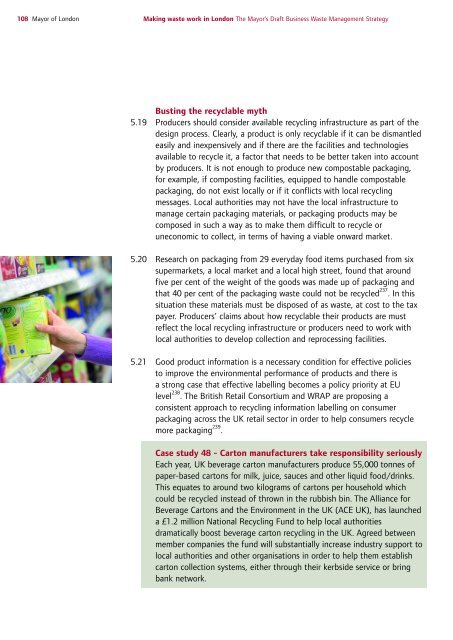Draft Business Waste Strategy PDF - london.gov.uk - Greater ...
Draft Business Waste Strategy PDF - london.gov.uk - Greater ...
Draft Business Waste Strategy PDF - london.gov.uk - Greater ...
You also want an ePaper? Increase the reach of your titles
YUMPU automatically turns print PDFs into web optimized ePapers that Google loves.
108 Mayor of London<br />
Making waste work in London The Mayor’s <strong>Draft</strong> <strong>Business</strong> <strong>Waste</strong> Management <strong>Strategy</strong><br />
Busting the recyclable myth<br />
5.19 Producers should consider available recycling infrastructure as part of the<br />
design process. Clearly, a product is only recyclable if it can be dismantled<br />
easily and inexpensively and if there are the facilities and technologies<br />
available to recycle it, a factor that needs to be better taken into account<br />
by producers. It is not enough to produce new compostable packaging,<br />
for example, if composting facilities, equipped to handle compostable<br />
packaging, do not exist locally or if it conflicts with local recycling<br />
messages. Local authorities may not have the local infrastructure to<br />
manage certain packaging materials, or packaging products may be<br />
composed in such a way as to make them difficult to recycle or<br />
uneconomic to collect, in terms of having a viable onward market.<br />
5.20 Research on packaging from 29 everyday food items purchased from six<br />
supermarkets, a local market and a local high street, found that around<br />
five per cent of the weight of the goods was made up of packaging and<br />
that 40 per cent of the packaging waste could not be recycled 237 . In this<br />
situation these materials must be disposed of as waste, at cost to the tax<br />
payer. Producers’ claims about how recyclable their products are must<br />
reflect the local recycling infrastructure or producers need to work with<br />
local authorities to develop collection and reprocessing facilities.<br />
5.21 Good product information is a necessary condition for effective policies<br />
to improve the environmental performance of products and there is<br />
a strong case that effective labelling becomes a policy priority at EU<br />
level 238 . The British Retail Consortium and WRAP are proposing a<br />
consistent approach to recycling information labelling on consumer<br />
packaging across the UK retail sector in order to help consumers recycle<br />
more packaging 239 .<br />
Case study 48 - Carton manufacturers take responsibility seriously<br />
Each year, UK beverage carton manufacturers produce 55,000 tonnes of<br />
paper-based cartons for milk, juice, sauces and other liquid food/drinks.<br />
This equates to around two kilograms of cartons per household which<br />
could be recycled instead of thrown in the rubbish bin. The Alliance for<br />
Beverage Cartons and the Environment in the UK (ACE UK), has launched<br />
a £1.2 million National Recycling Fund to help local authorities<br />
dramatically boost beverage carton recycling in the UK. Agreed between<br />
member companies the fund will substantially increase industry support to<br />
local authorities and other organisations in order to help them establish<br />
carton collection systems, either through their kerbside service or bring<br />
bank network.
















